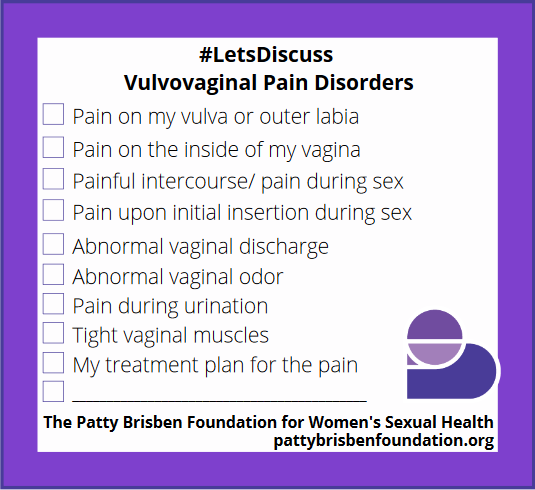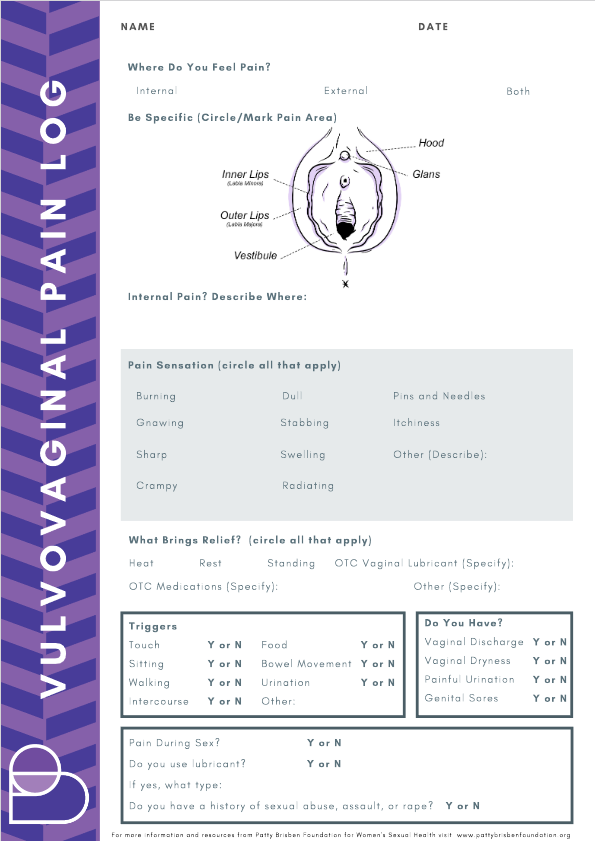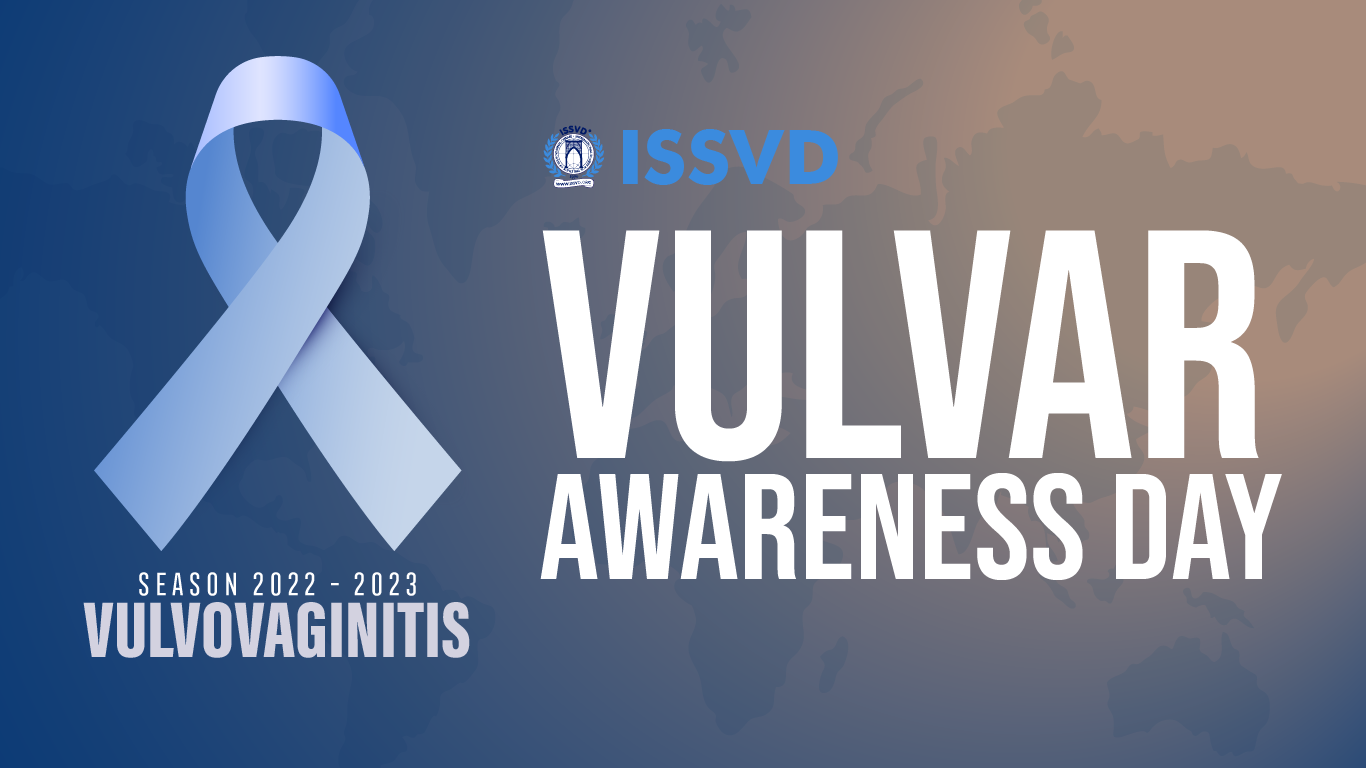“Vulvodynia is the medical term for chronic pain
or discomfort in the vulva
that lasts for at least three months”.1
Umbrella
What may the Vulvodynia Umbrella include?
Depending on the Source (DotS) this Umbrella may include:
- Burning Vulva Syndrome
- Dysaesthetic/Dysesthetic Vulvodynia
- Essential Vulvodynia
- Generalized Unprovoked Vulvodynia
- Generalized Vulvodynia
- Localised Provoked Vulvar Pain
- Localised Vulvodynia
- Neuroproliferative Vestibulodynia
- Pudendal Neuralgia
- Provoked Vulvodynia
- Superficial Dyspareunia
- Unprovoked Vulvodynia
- Vestibulitis
- Vestibulodynia
- Vulval Pain
- Vulvar Vestibulitis Syndrome (VVS)
- Vulvodynia
Vulva
What is the vulva?
DotS the definition of the vulva may vary. In Vulval Irritation the (Australian) Jean Hailes for Women’s Health’s (JH) definition is:
“Your vulva is the external part of your female genitals that you can see. Your vagina is inside your body”.2
Vulval Pain
What is vulval pain?
DotS the definition of vulval pain may vary. In Medical Advice: Vulval Pain – What Is Vulvodynia? Caredownthere.com.au explain:
Vulvodynia is also known as the “burning vulva syndrome””.3
Vulvodynia
What is vulvodynia?
DotS the definition of the vulvodynia may vary. In Vulval Pain: Vulvodynia the JH’s definition is:
“Vulvodynia is the medical term for chronic pain or discomfort in the vulva that lasts for at least three months. Any pressure applied to your vulva, such as having sex, inserting a tampon, using toilet paper or sitting for prolonged periods of time can be unbearable”.4
In What Is Vulvodynia? [+ Diagrams] the (United States) National Vulvodynia Association’s (NVA) definition is:
“Vulvodynia, simply put, is chronic vulvar pain without an identifiable cause. The location, constancy and severity of the pain vary among sufferers. Some women experience pain in only one area of the vulva, while others experience pain in multiple areas. The most commonly reported symptom is burning, but women’s descriptions of the pain vary. One woman reported her pain felt like “acid being poured on my skin,” while another described it as “constant knife-like pain””.5
In Vulvodynia the (United Kingdom) Vulval Pain Society’s (VPS) definition is:
“Vulvodynia is the term used to describe the condition experienced by women who have the sensation of vulval burning and soreness in the absence of any obvious skin condition or infection. The sensation of burning and soreness of the vulva can be continuous (unprovoked vulvodynia), or on light touch, e.g. from sexual intercourse or tampon use (provoked vulvodynia)”.6
Localised Vulvodynia
What is localised vulvodynia?
DotS the definition of localised vulvodynia may vary. In What Is Vulvodynia? What Is Localised Vulvodynia? [+ Diagrams] the NVA’s definition is:
“Most women have pain at only one vulvar site. If the pain is in the vestibule, the tissue surrounding the vaginal opening, the diagnosis is vestibulodynia (formerly known as vulvar vestibulitis syndrome (VVS))”.7
Provoked Vulvodynia (Vestibulodynia)
What is provoked vulvodynia?
DotS the definition of provoked vulvodynia may vary. In What Is Vulvodynia? What Is Localized Vulvodynia? [+ Diagrams] the NVA explain:
- Sexual intercourse
- Tampon insertion
- A gynecologic examination
- Prolonged sitting and/or
- Wearing fitted pants”.8
Unprovoked Vulvodynia
What may the pain be like in unprovoked vulvodynia?
In Vulvodynia: What Are the Symptoms? the VPS elaborate on:
 “The pain described by women with unprovoked vulvodynia is often of a burning, aching nature. The intensity of pain can vary from mild discomfort to a severe constant pain which can even prevent you from sitting down comfortably. The pain is usually continuous and can interfere with sleep. As with long-term pain from any cause you can have good days and bad days. Itching is not usually a feature of the condition”.9
“The pain described by women with unprovoked vulvodynia is often of a burning, aching nature. The intensity of pain can vary from mild discomfort to a severe constant pain which can even prevent you from sitting down comfortably. The pain is usually continuous and can interfere with sleep. As with long-term pain from any cause you can have good days and bad days. Itching is not usually a feature of the condition”.9 The VPS also note:
In some women with unprovoked vulvodynia the burning sensation can be generalised over the whole genital area. Alternatively it can be localised to just the clitoris (clitorodynia) or just one side of the vulva (hemivulvodynia)”.10
Generalized Vulvodynia
What is generalized vulvodynia?
DotS the definition of generalized vulvodynia may vary. In What Is Vulvodynia? What Is Generalized Vulvodynia? [+ Diagrams] the NVA’s definition is:
Activities that apply pressure to the vulva, such as prolonged sitting or sexual intercourse, typically exacerbate symptoms”.11
Duration
How long may vulvodynia symptoms last?
In Vulvodynia: Symptoms & Causes – Overview the (United States) Mayo Clinic explain:
“The pain, burning or irritation linked with vulvodynia can make you so uncomfortable that sitting for a long time or having sex becomes unthinkable. The condition can last for months to years”.12
Cause
What causes vulvodynia?
In Vulvodynia: What Causes It? the VPS explain:
“For a minority of women with vulvodynia, back problems such as slipped discs and others can cause spinal nerve compression and cause referred pain to the vulval area. In the majority of cases, however, the precise cause of the nerve damage or irritation remains unknown. Vulvodynia is known as an idiopathic condition, i.e. a condition with no known cause”.13
In Vulvodynia: Symptoms and Causes – What Causes Vulvodynia? the (United States) Cleveland Clinic also note:
- Inflammation
- Hormonal factors
- Genetic (inherited) factors
- Injury to your nerves (neuropathic problems)
- Long-term reactions to past vaginal infections
- Weakened pelvic floor muscles or muscle spasms
- Irritation from harsh products that touch your skin”.14
Common or Not
How common is vulvodynia?
In Vulval Pain: Vulvodynia the JH note:
“Vulvodynia can affect women of all ages, but it usually affects women from their mid-20s to 60s. It’s estimated about 16% of women will experience vulvodynia in their lifetime”.15
Health Care Provider
What if I think I have vulvodynia?
If you think you have vulvodynia, it may be in your best interest to choose to talk to your health care provider about this. The Mayo Clinic explain:
- An active infection from yeast or bacteria
- A sexually transmitted disease such as herpes
- An inflammatory skin condition
- Vulvar growths
- Genitourinary syndrome of menopause”.16
In Vulvodynia: Frequently Asked Questions – A Note From Cleveland Clinic the Cleveland Clinic also encourage us to seek help:
Health Topics A-Z
Where may I find Health Topics A-Z related to the Vulvodynia?
In Health Topics A-Z you may find:
Links
Where may I find Links related to Vulvodynia?
Your Country may have Links similar to:
Links
This Links List to third party websites is neither comprehensive nor exhaustive. Inclusion on this Links List does not imply endorsement or recommendation. Non-inclusion on this Links List does not imply non-endorsement or non-recommendation. Third party websites are not under the control of Meno Martha International Menopause Directory. Third party websites may contain explicit medical images and/or sexual references. Please read Meno Martha International Menopause Directory’s Links Policy before proceeding to a Link. Please contact Webmaster if you experience a problem with a Link.New or Updated
- About Vulval Pain
- Advice for Daily Life
- Australian and New Zealand Vulvovaginal Society: Patient Information
- Australian and New Zealand Vulvovaginal Society: Patient Information – Vulval Anatomy
- Australian and New Zealand Vulvovaginal Society: Patient Information – Vulvovaginal Pain
- Caredownthere.com.au
- Diagnosis
- Diagnosis and Management of Vulvodynia In Postmenopausal Women
- Differentiating Overlapping Symptoms of Vulvodynia and Pudendal Neuralgia
- Disorders of the Vulva: Common Causes of Vulvar Pain, Burning, and Itching
- Essential Information: Caring for Your Skin Down There
- Essential Information: See Your Doctor If
- Essential Information: Some Facts About the Vulva
- FAQs: Vulvodynia
- FAQs: Vulvovaginal Health
- Get Support
- Get Support: Advice for Daily Living
- International Society for the Study of Vulvovaginal Diseases: Patient Handouts
- International Society for the Study of Women’s Sexual Health
- International Society for the Study of Women’s Sexual Health: Find A Provider
- Later Years (Around 50 Years and Over): Menopause and Post Menopause Health – Sexual Wellbeing, Intimacy and Menopause [+ Video: Menopause Is the End of Your Sex Life] [Other Languages and Formats]
- Let’s Talk About Vulvas
- Medical Advice: Medical Exams
- Medical Advice: Vulval Pain
- Menopause Mindfulness: Embracing the Change of My Midlife
- Menopause Preparedness Toolkit: A Woman’s Empowerment Guide
- National Vulvodynia Association
 National Vulvodynia Association: For Patients – How NVA Can Help You
National Vulvodynia Association: For Patients – How NVA Can Help You- National Vulvodynia Association: Other Resources
- National Vulvodynia Association: Patient Booklets
- Neuroproliferative Vestibulodynia
- Painful Intercourse (Dyspareunia)
- Patty Brisben Foundation for Women’s Sexual Health
- Patty Brisben Foundation for Women’s Sexual Health: Guide To Sexual Health Providers
- Patty Brisben Foundation for Women’s Sexual Health: New! Sexual Anatomy 101
 Patty Brisben Foundation for Women’s Sexual Health: Vulvovaginal Pain Log
Patty Brisben Foundation for Women’s Sexual Health: Vulvovaginal Pain Log- Pelvic Exam
- Pelvicpain.org.uk [Pelvic Pain Support Network, United Kingdom]
- Perimenopause and Menopause Symptom Checklist
- Prosayla Supported By ISSWSH [International Society for the Study of Women’s Sexual Health]
- Pudendal Nerve Entrapment
- Pudendal Nerve Entrapment (PNE)
- Pudendal Neuralgia
- Pudendal Neuralgia
- Pudendal Neuralgia
- Self-Help Tips
- Sex & Sexual Health
- Tips To Help Manage Menopause Symptoms
- Topical Treatment of Vulvodynia, Dyspareunia and Pudendal Neuralgia: A Single Clinic Audit of Amitriptyline and Oestriol In Organogel
- Treating Vulval Pain
- Vaginal Pain
- Vaginismus
- Vaginismus
- Vestibulodynia (Formerly Vulval Vestibulitis)
- Video Series-2022: Discussing Sexual Health Concerns With Your Health Care Professional
- Video Series-2024: Preparing for Your Menopause Health Care Visit
- Vulva and Vagina
- Vulval and Vaginal Conditions
- Vulval Irritation
- Vulval Pain
- Vulval Pain
- Vulval Pain Conditions
- Vulval Pain Society
- Vulval Pain, Vulvar Vestibulitis Syndrome (VVVS)
- Vulval Pain: Pudendal Neuralgia
- Vulval Pain: Vulvodynia
- Vulval Self-Examination
- Vulvar Anatomy
- Vulvar Awareness Day [18 September 2023]

- Vulvodynia
- Vulvodynia
- Vulvodynia
- Vulvodynia (Vulval Pain)
- Vulvodynia Treatments
- Vulvodynia: Diagnosis & Treatment
- Vulvodynia: Diagnosis and Tests
- Vulvodynia: Management and Treatment
- Vulvodynia: Symptoms & Causes
- Vulvodynia: Symptoms & Causes – Alternative Medicine
- Vulvodynia: Symptoms & Causes – Lifestyle and Home Remedies
- Vulvodynia: Symptoms and Causes
- Vulvovaginal Atrophy
- Vulvovaginal Pain
- Vulvovaginal Pain: What Is Vulvodynia and How Does It Relate To Vulvovaginal Pain?
- Webinars: Previous – Pay Attention on Your Way In! The Vulva Is An Important Organ Too
- What Causes Vulvodynia?
- What Is Vulvodynia? [+ Diagrams]
- What Is the Vulva?
- What’s Normal: What Is Normal Vulval & Vaginal Anatomy?
- When Sex Hurts – Podcast [Vaginismus and Vulvodynia]
Sources
Where may I find the Sources quoted?
You may find the Sources quoted:
Sources
- Vulval Pain: Vulvodynia. Last Updated: 23 January 2024 | Last Reviewed: 26 April 2023. Jean Hailes for Women’s Health https://www.jeanhailes.org.au/health-a-z/vulva-vagina/vulval-pain Accessed: 09 May 2024
- Vulval Irritation. Last Updated: 22 April 2024 | Last Reviewed: 26 April 2023. Jean Hailes for Women’s Health https://www.jeanhailes.org.au/health-a-z/vulva-vagina/vulval-irritation Accessed: 09 May 2024
- Medical Advice: Vulval Pain – What Is Vulvodynia? Caredownthere.com.au https://www.caredownthere.com.au/_pages/advice.html Accessed: 09 May 2024
- Vulval Pain: Vulvodynia. Last Updated: 23 January 2024 | Last Reviewed: 26 April 2023. Jean Hailes for Women’s Health https://www.jeanhailes.org.au/health-a-z/vulva-vagina/vulval-pain Accessed: 09 May 2024
- What Is Vulvodynia? National Vulvodynia Association https://www.nva.org/whatIsVulvodynia.html Accessed: 09 May 2024
- Vulvodynia. Vulval Pain Society http://www.vulvalpainsociety.org/vps/index.php/vulval-conditions/vulvodynia Accessed: 09 May 2024
- What Is Vulvodynia? What Is Localized Vulvodynia? National Vulvodynia Association https://www.nva.org/whatIsVulvodynia.html Accessed: 09 May 2024
- What Is Vulvodynia? What Is Localized Vulvodynia? National Vulvodynia Association https://www.nva.org/whatIsVulvodynia.html Accessed: 09 May 2024
- Vulvodynia: What Are the Symptoms? Vulval Pain Society http://www.vulvalpainsociety.org/vps/index.php/vulval-conditions/vulvodynia Accessed: 09 May 2024
- Vulvodynia: What Are the Symptoms? Vulval Pain Society http://www.vulvalpainsociety.org/vps/index.php/vulval-conditions/vulvodynia Accessed: 09 May 2024
- What Is Vulvodynia? What Is Generalized Vulvodynia? National Vulvodynia Association https://www.nva.org/whatIsVulvodynia.html Accessed: 09 May 2024
- Vulvodynia: Symptoms & Causes – Overview. 01 September 2023. Mayo Clinic https://www.mayoclinic.org/diseases-conditions/vulvodynia/symptoms-causes/syc-20353423 Accessed: 09 May 2024
- Vulvodynia: What Causes It? Vulval Pain Society http://www.vulvalpainsociety.org/vps/index.php/vulval-conditions/vulvodynia Accessed: 09 May 2024
- Vulvodynia: Symptoms and Causes – What Causes Vulvodynia? Last Reviewed: 27 December 2022. Cleveland Clinic https://my.clevelandclinic.org/health/diseases/17878-vulvodynia Accessed: 09 May 2024
- Vulval Pain: Vulvodynia. Last Updated: 23 January 2024 | Last Reviewed: 26 April 2023. Jean Hailes for Women’s Health https://www.jeanhailes.org.au/health-a-z/vulva-vagina/vulval-pain Accessed: 09 May 2024
- Vulvodynia: Symptoms & Causes – Overview. 01 September 2023. Mayo Clinic https://www.mayoclinic.org/diseases-conditions/vulvodynia/symptoms-causes/syc-20353423 Accessed: 09 May 2024
- Vulvodynia: Frequently Asked Questions – A Note From Cleveland Clinic. Last Reviewed: 27 December 2022. Cleveland Clinic https://my.clevelandclinic.org/health/diseases/17878-vulvodynia Accessed: 09 May 2024



